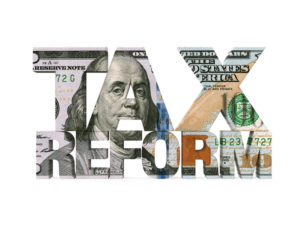
As you might be aware, tax reform bills have passed in both the House and Senate. Both of these bills have some differences and are currently in the process called “reconciliation” to bring one bill to the President for his signature. We will have to wait and see what the final bill includes, but as 2017 is coming to a close rather quickly, there are some year-end “moves” you might want to consider in anticipation of the coming changes for 2018. Most items included in a new tax law will be effective January 1 of 2018, so this year-end’s planning becomes important to obtain the maximum tax benefits. Otherwise, certain deductions may be lost forever.
Here are some planning points for you to consider in light of the anticipated tax law changes:
State and Local Taxes
Currently, real estate taxes are deductible for all property owned by a taxpayer, and all state and local income taxes are deductible.
Under the House and Senate plans, there would be a cap of $10,000 for state and local property taxes ($5,000 for married taxpayers filing separately). The deduction for state and local income taxes potentially might be eliminated altogether.
Therefore, if you are an itemizer, you may want to pay your property tax payments for 2018 ahead of time to include the deduction in your 2017 return. You may also want to consider paying any state and local estimated income taxes in 2017, since the deduction may be lost if you wait until 2018.
Charitable Donations
Since the tax bills are both doubling the standard deduction for all taxpayers (married filing joint to $24,000 and single to $12,000), many taxpayers will no longer be able to itemize deductions, but will instead just take the increased standard deductions. As a result, this may be the last year many taxpayers obtain a tax benefit for charitable contributions.
Therefore, you may want to consider accelerating any planned donations from 2018 into 2017. This will also make the ability for taxpayers who are taking required minimum distributions from IRA’s to make their charitable contributions directly from an IRA account.
Mortgage Interest and Home Equity Loans
Currently, mortgage interest is deductible for mortgages on a first or second home. The acquisition debt – that is, mortgages obtained to acquire the property – is capped at $1M and home equity indebtedness – defined as debt secured by the home in excess of acquisition debt – is capped at $100K.
The House plan would reduce the mortgage interest deduction limitation to $500K of debt and limit it to the taxpayer’s primary residence only. It would eliminate the interest deduction on home equity indebtedness altogether.
The Senate plan would keep the limitation of $1M on acquisition debt, but would also limit the deduction on home equity indebtedness.
Therefore, you may want to consider paying down any loans where the interest deduction would be eliminated next year.
Medical Expenses
Currently, medical expenses in excess of 10% of adjusted gross income (7.5% for ages 65 or older) are deductible as an itemized deduction.
Under the House Bill, medical expense deductions would be eliminated. Under the Senate Bill, the deduction is preserved, and the threshold is reduced to 7.5% of adjusted gross income for 2018.
Between the potential for the elimination of the deduction altogether and the increase in the standard deduction, if you currently are near or are close to the 10% limit for 2017, you may want to consider accelerating payments for medical expenses prior to year-end. You may also want to consider scheduling any elective procedures before year-end for you or your dependents.
Other Items to Consider
You will still have the usual decisions to delay or accelerate income and expenses – such as increasing or decreasing 401k or retirement plan contributions, Health Savings Accounts, etc. Investment and capital gain planning will take on a new wrinkle as both bills will now require the use of the FIFO method, instead of the taxpayer having options of methods to recognize gains. If you’re in business, should you buy new assets this year by December 31 when the tax rates are higher, or wait until the rates potentially drop next year?
Both the House and Senate Bills are extremely comprehensive and touch on many other areas, including Alternative Minimum Tax, elimination of other itemized deductions, Alimony, Child Tax Credits, Education Credits, and so on.
Of course, we cannot touch on all topics and scenarios here. Therefore, we would encourage you to reach out to us with any specific questions you may have on your own situation. As these two Bills are reconciled and potentially become law, we will continue to keep you informed. Please contact us with any questions. We are happy to be of service.









 We are currently seeking a Staff Accountant. If you have a minimum of 3 years experience in a CPA firm, have substantial experience with QuickBooks and are a CPA or working towards your CPA designation, this could be the job for you! Learn more and apply
We are currently seeking a Staff Accountant. If you have a minimum of 3 years experience in a CPA firm, have substantial experience with QuickBooks and are a CPA or working towards your CPA designation, this could be the job for you! Learn more and apply  “You are not a priority.” As a small business owner who is seeking to grow your customer base and serve your current customers well, we expect you would never dream of saying this to your customers. It is certainly not our practice to respond this way when a client asks for our assistance. And yet, many of us have had an experience in business where that message is communicated, if not by words then through the type of service provided (or not provided).
“You are not a priority.” As a small business owner who is seeking to grow your customer base and serve your current customers well, we expect you would never dream of saying this to your customers. It is certainly not our practice to respond this way when a client asks for our assistance. And yet, many of us have had an experience in business where that message is communicated, if not by words then through the type of service provided (or not provided).